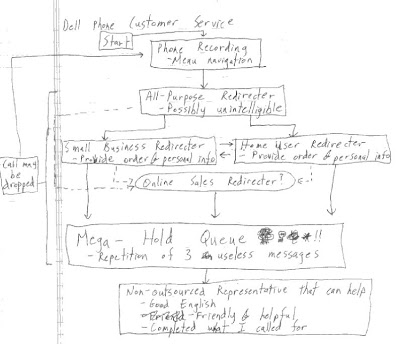I've heard bad stories about phone customer service, but I never experienced it first-hand until two days ago.
Since I'm moving soon, I thought that I should get a laptop for portable use. I really only need a computer to check email and browse the web, so I decided to get a low-end laptop with only the bare minimum components. I did some research and read some reviews, and decided to just go with Dell. So I ordered a laptop from Dell's website, selecting the Windows Vista and 512MB RAM options. Some of you may be cringing and moaning. Sorry about that- I hadn't done much research on Vista, but the next day I discovered that I would need 1GB+ of RAM to be able to run the operating system anywhere near smoothly. Since the laptop hadn't been shipped yet, I looked for ways to upgrade my order to include more RAM. I expected to be able to punch in my order number somewhere on Dell's website, check some box, and be done with it. After browsing the Dell website for a while and emailing their support, I soon found that I would need to call their customer service line to make the desired upgrade. It can't be that bad right?
I was leaving for the airport soon, so I figured I'd just use my time waiting in the terminal to make the order upgrade. I was armed with a cell phone and a newly upgraded monthly plan, the 1-800 number provided to me in the email response I got from Dell support, and a 1-800 number I found on the Dell website for "order status" customer service. I couldn't find a number for anything related to order upgrades or modifications anywhere on the website. I also had a pad of paper with my order number and customer number, and the credit card that I used for the order. I arrived at the airport 2 hours early, and was in the terminal 1.5 hours before takeoff. I used the bathroom, found a seat at the terminal, and whipped out my phone.
First, I called the number that was provided in the online support email response, and got the automated recording. I listened to the series of options that specified the purpose of my call, and after slowly navigating several menus, I got put on hold, awaiting a phone representative. The wait wasn't long, lasting only a few minutes. A guy picked up and asked me about what I needed in near-unintelligible english. I picked up "order number" somewhere in there, so I gave that number. After being muttered something that resembled "thank you" and "please wait," I got put on hold again. A few minutes later a lady picked up the phone, and asked what I needed(this time I fully understood her). I told her that I just wanted to upgrade an online order, and she asked for my order number again. She also asked me for my name, address, and phone number. She put me on hold again, to be redirected to the "online sales department." After hearing music for a few minutes, the line went quiet. I wasn't sure whether I was still supposed to hold, but after several minutes I assumed that my call was dropped, and I hung up and called the first number again.
I navigated through all of the menus again, and a lady picked up, and redirected me to another department. After giving my order number and verifying my name, address, and phone, she informed me that I ordered my laptop under the "small business" category, and not the "home user" category(what?), and that she would need to transfer me to someone else. She also gave me a direct number to the small business department, "in case the line is dropped."
Several minutes later another guy picked up the phone, and I asked him how I could upgrade my order. He already had my order number, but asked me to verify my name, address, and phone number again for security reasons. He told me that he'd redirect my call to someone that could fix my order, and put me onto what I'll call the "mega-hold queue." The mega-hold queue included three cycling messages. This is what I remembered of them:
1. "The wait may be longer than 10 minutes... we apologize for the delay..."
2. "...Press 1 if you want to check on your order status, Press 2 if want to leave a voicemail and we'll call you back, or stay on the line to continue waiting..."
3. "Our normal business hours are..."
I heard those three messages repeated probably 10-20 times, with 30 or so seconds of generic hold music played in between each message. At that point I really wished that I had a second cell phone that I could use to try the other phone support lines just to see if there were some better way to get service. I felt like I was navigating a 3-dimensional maze in zero gravity with a blindfold on. And that there might possibly be some way to just get lucky (or have the secret experience and know-how) to stumble straight to the end of the maze. But me, I was just lost somewhere deep inside. While holding, I drew up a diagram for my best guess of how the phone customer service system works:

I added the last box once someone finally picked up from the mega-hold queue and completed my request. The flight had already begun boarding, and I got in line to get on the plane.


